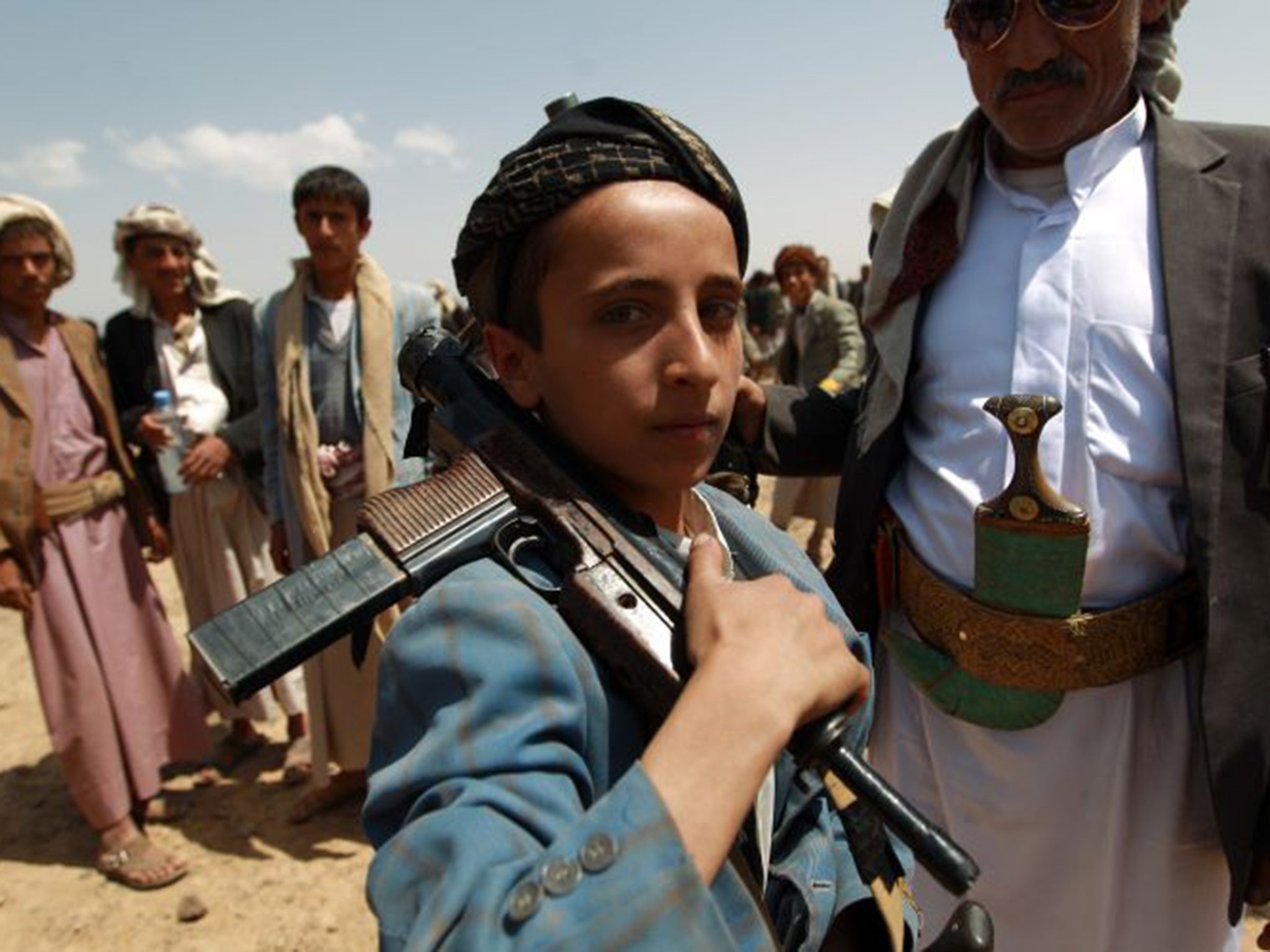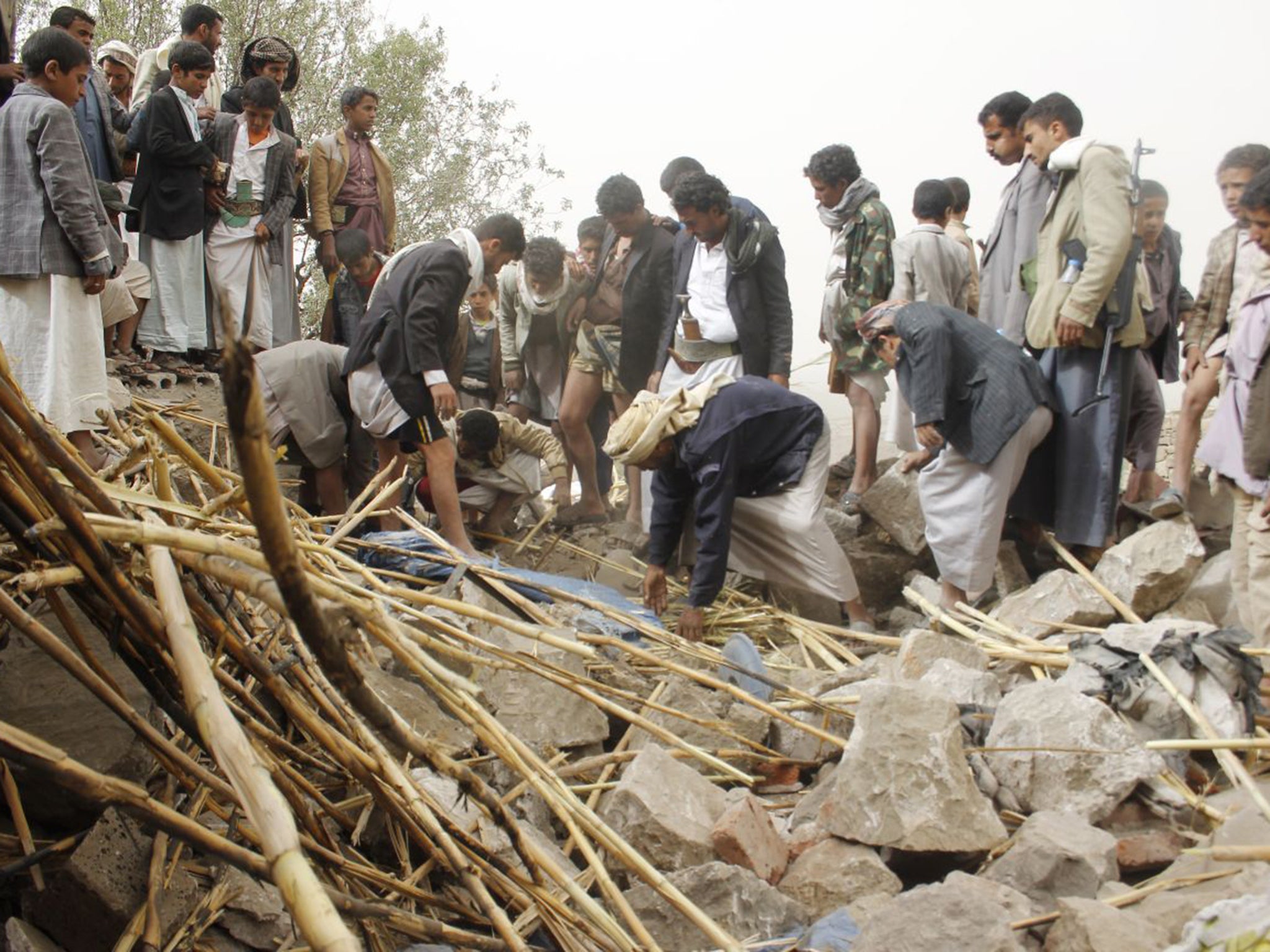Yemen crisis: Meet the child soldiers who have forsaken books for Kalashnikovs
With schools forced to close, children as young as seven have been recruited by the Shia Houthi rebels

At the entrance of Bab Al-Yemen, Old Sanaa, a waif-like Hassan, dwarfed by his Kalashnikov, stands at a checkpoint. His dark eyes scan vehicles as they pass through.
Like most seven-year-olds in Sanaa, Hassan used to spend his time at school – or playing table football with his friends. That was until three weeks ago.
“Now my school is closed,” he says, carefully scrutinising the white Toyota Yaris entering the old city. In less than a week, Hassan went from being a pupil in class to manning the capital’s checkpoints on behalf of the Houthi rebels. Their takeover of the city last year eventually led to Yemen’s president fleeing the city and pushed the country towards the current clashes around the nation. “We are fighting to protect our country from the enemies,” Hassan says indignantly.

More than 700 people are believed to have been killed in recent weeks, including dozens of children, who are increasingly caught up in the fighting. Thousands have been injured and more than 150,000 people have been displaced around the country, according to the UN.
Last month, fighting between the Houthi rebels and the Saudi Arabia-backed forces of President Abed Rabbo Mansour Hadi intensified. As a result, Saudi Arabia, with a number of other regional Sunni allies, launched an intensive campaign of airstrikes against the Houthi at the end of the month. That campaign, which has involved targets across the country, continues. There were clashes in the city of Taiz, following airstrikes the night before.
Mr Hadi fled the capital earlier this year to Aden, which has become the scene of some of the most intense fighting as the Houthis push south from their northern strongholds. Meanwhile, independent tribes – some aligned to Mr Hadi, some not – and others seeking separation of the south from the rest of the country have been drawn into the conflict.
In addition, al-Qaeda’s franchise in the country, Al-Qaeda in the Arabian Peninsula (Aqap), is looking to take advantage of the power vacuum. It has made gains in recent days. There is also clear potential for the involvement of groups that might align themselves with Islamic State (Isis). Some reports say some of these have already done so.
Jamal al-Shami, chairman of the Democracy School, a local NGO based in Sanaa, says responsibility for the increasing involvement of children in the conflict lies not only with the government, but also with the Houthis and southern militias who have been encouraging them to take up weapons. Children can be drawn in by money and a sense of duty to defend their tribal factions.
“Schools are closed and children have easy access to weaponry,” he says. “All parties to the conflict have welcomed them with open arms. It’s a mess.”
Hassan is one of millions of Yemeni children whose access to education ended when the Saudi-led coalition began its military campaign to dislodge the Houthi rebels.
An official from the UN warned earlier this month that around 30 per cent of fighters in the armed groups involved in the conflict are under 18. “We are seeing children in battle, at checkpoints and, unfortunately, among [those] killed and injured,” Julien Harneis, Unicef’s representative in Yemen, told the French news agency AFP.
The precarious security situation makes the exact numbers of young combatants, who are with several warring factions, hard to obtain.
Such combatants on the front line, inspecting vehicles or patrolling the heavily fortified checkpoints in Yemen, are not uncommon. Children have been used for military purposes even before the Houthi rebels took over Sanaa, despite the official age for joining Yemen’s army being 18.
The apparent increase in child soldiers comes despite previous attempts to put an end to the recruitment of minors by the Yemeni Armed Forces and others. Last May, an action plan was signed between the Yemeni government and the UN to formally end and prevent any further recruitment of children. Abdul-Malik al-Houthi, leader of the Houthis, also previously pledged that he would stop recruiting child soldiers But this has not affected Hassan. “Our leader [referring to the Houthi] has called us to fight the enemy. I carry a weapon to protect myself, my family and my country,” he says proudly.

Hassan, who lives in the Safiya district of Sanaa, has no formal training but he says: “My father teaches me to use the Kalashnikov.”
Another combatant is 11-year-old Asif. Since he was six, he has been visiting Saada, in northern Yemen, to train with the Houthi rebels.
“I will only do what is said in the Koran,” he says. “I don’t enjoy school, I’ve never been to school. I enjoy fighting for my country against Saudi Arabia and Isis.” Despite being trained for the front line, Asif says his work has centred around patrolling the streets and manning the capital’s security checkpoints.
Once the Houthi rebels entered the capital, he started carrying his gun regularly. He denies receiving remuneration, but concedes he gets a meal and a bag of khat, a narcotic plant widely used in the region, in return for his participation.
“My parents are proud of me and encourage me to fight,” he says.
With war waging in different parts of the country, many families encourage their young to fight with the militias, says Mr Shami. “For them, it is also a much-needed source of income.”
Saudi Arabia has repeatedly accused Shia-majority Iran, which supports the Houthis, of supplying the rebels with training, along with other help. This is something Iran has denied, although the war of words has raised fears about wider implications for the region.
Iranian President Hassan Rouhani has warned Saudi Arabia that, through the airstrikes, it has “planted the seeds of hatred in this region, and you will see the response sooner or later”.
Iran said last week that it had submitted a letter to UN Secretary-General Ban Ki-moon outlining a four-point peace plan for Yemen. Its Foreign Minister, Mohammad Javad Zarif, said this calls for an immediate ceasefire and an end to all foreign military attacks. In addition, it wants humanitarian assistance and a resumption of a broad national dialogue, as well as the “establishment of an inclusive national unity government”.

Even before the airstrikes, more than 16 million of Yemen’s population were in need of humanitarian assistance. The intensity of the air campaign – and the huge numbers of displaced people – have meant rising unemployment. In many instances, this has forced young children to shoulder the financial burden of their families.
The UN appealed late last week for $274m (£183m) in humanitarian aid for the country. It was then reported that Saudi Arabia had pledged that much itself.
Mohammed, 13, from the Hajjah province in west Yemen, has not seen his family for more than six months. He has been travelling across the country to fight with the Houthi rebels. Without school, his experience of childhood is of firing guns in battle. “Last year, I went to fight with the Houthis – first in Amran and then in the capital in Sanaa,” he declares proudly. “Like me, there are hundreds of young children fighting with [the Houthis] in Marib [a city to the east of Sanaa].”
From Shahara, next to Hajjah province, Mohammed dismisses the need for school, saying his parents never had an education. The family sustain themselves by working the farm, growing wheat and barley.
Mr Shami warns that there will be bigger battles ahead, if and when the war ends. “Many children have got used to the income, violence and battlefields. It will be hard to convince them to return to a classroom.”
Names have been changed to protect identities, and no one in this feature appears in the accompanying photographs
Join our commenting forum
Join thought-provoking conversations, follow other Independent readers and see their replies
Comments